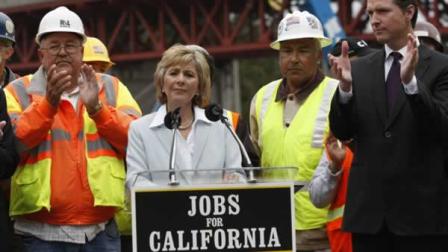
(Note: Much of this story comes from "Making Lawmakers Answer for Pedestrian Deaths in Their Districts" that appeared on Streetsblog Capitol Hill yesterday.)
No matter how you count it, California is a dangerous place for pedestrians. A recent report by Transportation for America showed that nearly 7,000 pedestrians were killed in California's streets between 2001 and 2010. Now, thanks to an addendum to T 4 America's annual "Dangerous by Design” report, we can now quantify the death toll by Congressional district. After Florida, California has the most districts with high numbers of deaths. Californians can see how dangerous their Congressional District has been by clicking here.
This places Senator Barbara Boxer in a tough place. As Chairwoman of the Senate Committee on the Environment and Public Works, Boxer is the Senate's point person in dealing with far more conservative members of the House of Representatives when it comes to creating a transportation funding and policy bill that can pass both chambers and be signed by President Barack Obama.
Keeping pedestrians safe is just one consideration the Senator has to weigh, but advocates hope that it is a top one. “Having saddled communities with unsafe streets, it would be the height of cruelty for Congress now to take away resources and latitude from local communities trying to improve those conditions and save lives,” said James Corless, director of Transportation for America, in a statement.
T4America found that the majority of pedestrian deaths occur on roadways that encourage speeding but do not provide sidewalks, crosswalks, signals and other protections for people who are walking. Their push to remind Congress of the pedestrian death toll due to unsafe road conditions is supported by AARP, the National Association of County and City Health Officials, and the American Public Health Association. AARP notes that Americans 65 and older are 65 percent more likely to be killed while walking than the population as a whole. And Susan Polan of the American Public Health Association noted that the obesity epidemic should force Congress to act.
“At the very moment that Congress began debating whether or not to preserve programs like Safe Routes to School and others designed to make walking and biking safer, the CDC reported that almost 32 percent of 2- to 19-year-olds and nearly 69 percent of adults in America are overweight or obese,” said Polan.
But even as the battle over bicycle and pedestrian funding looms, a new hurdle has emerged for the ostensibly pro-environment Boxer. House Republicans have used the transportation reauthorization bill to step up attacks on federal environmental laws especially the National Environmental Policy Act (NEPA). One of the main planks of the Republicans attack is a plank that would set a hard deadline of nine months on every NEPA review for transportation projects.
Deron Lovas, the Federal Transportation Policy Director for the National Review, explains why this change could be a disaster. "Proposed hard deadlines and fines mean that transportation agencies—particularly state and federal highway agencies that try to be and successfully are excluded from environmental reviews as often as possible (more than 90% of projects are 'categorically excluded' from NEPA review)—can merely pretend that they are looking around, but in reality have their heads in the sand until the deadline. Then, after the deadline, they will be given an automatic OK to continue on with their original plan while ignoring local context."
Lovas' full statement can be read at National Resources Defense Council review of the environmental changes.
The news out of the conference committee has been grim. But this week, leaders re-energized their campaign to get the bill done, and the House voted overwhelmingly yesterday to compel the conference to finish work by tomorrow. In all that drive to get a bill done, lawmakers need to know that constituents won’t be satisfied with just any bill. Legislation that fails to protect the most vulnerable road users will end up costing us in the end.
Californians can contact Senator Boxer through a form on her website, or by calling the Washington D.C. office at 202-224-3553.





